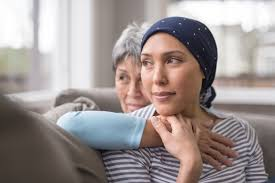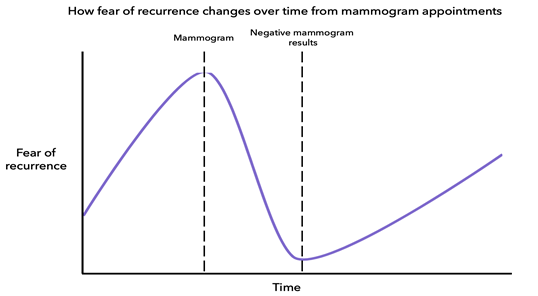One of the most common issues discussed by cancer survivors is the fear of recurrence. What do you do when you’re done with active treatment but don’t know what to do next? People have time to think about what has transpired and plan for the future after treatment is completed. Uncomfortable thoughts and a sense of unease or fear about the risk of cancer recurrence come for many for the first time.
According to Dr Sandeep Nayak, one of the best oncologists in India, “A cancer survivor’s fear of recurrence is pretty prevalent.
Anxiety affects half of all survivors, but in 20-50 percent of cases, the fear is clinically substantial and has a considerable impact on their life.
What is cancer recurrence fear, and how frequent is it?
Fear of cancer recurrence is defined as “fear, worry, or concern about the risk of cancer returning or progressing.” However, there is no single definition for fear, nor is there a consistent technique to measure it.
Most oncologists have experienced that most cancer survivors have feelings of insecurity and worry about the future. Physical fragility, a sense of loss about the future, and fear about your life, as well as your family’s life, are all common after treatment and should be acknowledged.
Those who have undergone cancer treatment characterize the initial months as a period of transition. It’s not only about “getting back to normal” but also about figuring out what “normal” means to you right now. People frequently claim that life has taken on a new meaning for them or a fresh perspective on things.
Most cancer survivors face a great deal of uncertainty ahead of them. They may experience psychosocial disorders such as worry, depression, post-traumatic stress, financial problems, or difficulties returning to work. A scan appointment, for example, is likely to cause some degree of distress. This worry can be exceptionally high in the days leading up to a follow-up scan. It’s even been given a name: scanxiety.

Fear of cancer recurrence, on the other hand, is more sophisticated than merely worry or fear. The following are some of the signs that a cancer survivor may require outside assistance:
· A high amount of anxiety;
· Pervasive and uncontrollable thinking;
· Severe distress (such as pain and suffering);
· Difficulty creating long-term plans;
· An inability to cope; and
. Struggling to keep track of daily duties and activities
Why are some people more likely than others to be terrified of a cancer recurrence?
According to the best oncologist in India, those diagnosed with cancer while younger (18-45 years old) have a more significant fear of cancer recurrence than those diagnosed when they are older (55-70 years old). According to various studies, having this fear was linked to a higher frequency of unscheduled visits to the doctor and not having had mammograms, ultrasounds, or other forms of cancer screening in the previous year.
Throughout treatment, the fear of cancer returns varies a lot. Physical symptoms, visits to the doctor, and other environmental stimuli all play a role in this variation. These include seeing cancer advertisements, planning a future family date, or learning about another person’s diagnosis.
What changes in fear of recurrence over time?
Taking the example of breast cancer, the fear of a recurrence of breast cancer changes throughout time. Fear was higher before having a mammogram, dropped immediately after receiving negative mammography findings, and increased over the month following the scan.
However, recent research has discovered that this dread is frequent and persists throughout time, even five years after diagnosis.
The fear of cancer recurrence takes different forms in different people. Some patients’ dread fades over time as they go further away from their original diagnosis.

However, some patients say they feel increasingly threatened as time goes on. They are afraid to believe that they are fully free of the risk of cancer recurrence. They may view this as a defensive measure to ensure that they are not emotionally devastated if cancer returns.
How should the family deal with the possibility of a cancer recurrence?
Sometimes, there is a “tyranny of silence” in which families attempt to protect each other by not expressing their fear. Instead of bringing the family closer together, this inclination may generate division. Understandably, discussing cancer’s recurrence of the disease it can be frightening. However, the more families can find a way to be open and honest about their feelings, the less stress they will have to bear in the long run.
What is the best way to deal with this fear?
· Be aware of the signs and symptoms. Dr. Sandeep Nayak explained, “It’s natural to be hyper-aware of aches and pains and fear that each one signals your cancer has returned.” As a result, make sure to ask your oncologist the symptoms to be on the lookout for and to report them straight away. Always seek guidance from your oncologist if you have any concerns. Also, keep in mind that an ache is often just that: an ache.
· Take actions to reduce your scanxiety. Schedule scans early in the day to avoid long lines and to ensure that you have assistance in place before your appointment. Surround yourself with individuals you can rely on while you wait for results. The best oncologist in India highly recommends distracting yourself from something pleasurable (such as a massage or a supper out with a close friend) or something that will keep you occupied (such as an engaging movie or book).

· Accept uncertainty as best you can. No one can guarantee that cancer will not recur, which is a challenging emotional situation. Dr. Sandeep Nayak advised, “Try to remember yourself that uncertainty is a part of life.” “No one knows what will happen next.” But, rather than stressing about the future, try to focus on the here and now.
· Take responsibility for what you can. Show up for every visit and test that the best oncologist in India recommends as part of your cancer treatment plan. Return to your routine as much as feasible. Setting a daily routine, for example, can help you feel more in control.
· Obtain assistance. Rather than trying to bottle up your anxieties, talk about them honestly. It can make you feel more supported and robust. So find a trusted friend or loved one who is good at listening, a church member who can console you, or a mental health expert who can help you deal with your fears.

